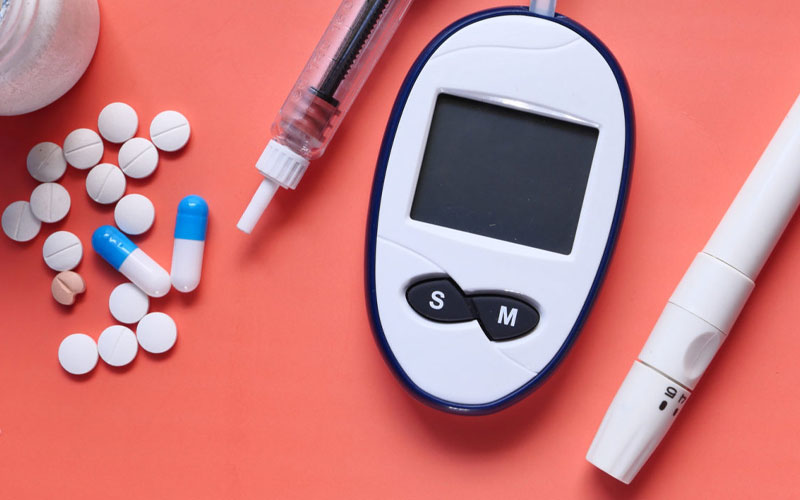Caring for Your Diabetes During a Pandemic
Do you or your loved ones have diabetes? Let’s address some concerns so that you can live your healthiest life during tough times.
The COVID-19 pandemic has brought many changes to healthcare, and much emphasis on population health. One of the chronic diseases that is widespread in our modern society is Type II Diabetes. Diabetes management requires daily care and balance of blood sugar, regular checkups by a physician, and an optimum routine of good diet and exercise. Maintaining control of diabetes is difficult, even in what we consider “normal” times, but add a pandemic that changes daily routines, adds stress, and reduces access to healthcare, and you can have a recipe for disaster!
The numbers are also revealing that diabetics are in the high-risk population for not only contracting COVID-19, but also having poorer outcomes when fighting the disease. Read ahead for tips on maintaining your health during a pandemic, boosting your immune system as much as possible, and caring for yourself and your diabetes if you contract COVID.
Maintain good blood sugar control
Did you know that when your blood sugar is too high it lowers your immune system? Keeping your diabetes in check will also minimize any needs you may have to seek care in an Emergency Room, which places you at higher risk. A recent study from Cell Metabolism reveals that diabetics with well-controlled glucose (blood sugar) had a lower death rate that those with poorly controlled glucose. So, what are the best ways to control your blood sugar?
Low glycemic diet. You can find a wealth of resources, dietary tips, and recipes at www.diabetes.org and your provider can also refer you for nutrition education. Take advantage of all of the resources available to you and learn as much as possible! Learning to make dietary lifestyle changes is the number one way to control blood sugars and prevent damage to your body from diabetes. Try some new recipes and get creative!
Exercise. Regular exercise, such as walking or aerobics, helps the body burn carbohydrates and maintain a healthy balance. It also strengthens your muscles, burns fat, and helps keep your bones and joints healthy. Exercise can be a slow build-up over time, but it is important to start moving – no matter what fitness level you are currently at.
Check your blood glucose. Sometimes it is easier to avoid reality and just not check it, but it is important to get into a routine. When you regularly do your blood sugar checks, you learn how various foods affect you and can adjust your diet accordingly. You learn what works! Keep a journal with your daily numbers and notes on what you ate if your blood sugar is high or at the optimum levels. This will help both you and your doctor make decisions about medications and diet.
Utilize Telehealth
Diabetics know that regular doctor appointments are important for managing their diabetes, reviewing medications, and doing regular blood tests, like electrolytes and A1C. COVID-19 has made access to primary care providers more difficult and raises concerns about visiting clinics and becoming exposed to the virus. What is to be done? Luckily, telehealth has seen a tremendous surge in usage and popularity as a solution for providing care – during the pandemic and beyond. You can now see and talk to your provider from the comfort of your own home! You will need a computer, tablet, or smartphone with broadband internet or cellular access.
Tips for Preparing for a Telehealth Visit:
- Choose a private area of your home or office – you will be able to focus and not worry about interruptions.
- Learn how to use the app or software before the appointment. A test run is always good. Have a tech-savvy friend or family member help you if needed.
- Have your medical history (if you have trouble remembering it) and your list of medications handy (or at least the bottles).
- Prepare to give your insurance information and credit card info.
- Write down your list of questions so you don’t forget anything!
- Keep that pen and paper ready to write down your doctor’s treatment plan.
- Don’t forget to discuss follow-up. Will you need another appointment?
If you are having trouble managing diabetes at home and see your blood sugar levels going up – don’t be afraid to reach out to your physician before you are at a crisis point. Most problems can be solved via virtual visits before you end up in an emergency situation.
Take Medications Consistently
Take your medications as prescribed, while keeping your journal of blood glucose levels. Medications are an important part of your treatment plan. Most people don’t like to take medicine, but it may be a necessary step to prevent your diabetes from progressing further and causing damage to your body. Whether you are on oral medications, injection, or insulin injections, it is important to remain consistent. Your physician can’t give you an accurate assessment and treatment plan without knowing how your body responds to the current plan.
Access to pharmacy supplies has been disrupted in some places, with restrictions on entering buildings, etc. Fortunately, many pharmacies now have drive-through services, or better yet – mail order. Be aware that during a pandemic, there may be fewer employees available, and shipping may be slower, and you will need to be proactive. Order medications early to ensure you have a good supply on hand, including other supplies like glucose strips. If you are having difficulties ordering ahead, your physician can sometimes send another prescription to allow you to get another week or two supply.
Manage Stress Levels
Don’t laugh – I know a pandemic is stressful. It is important to be aware of how that increased load of stress affects your body – and your diabetes. The body normally reacts to stressful situations by raising blood sugar levels. When you are under stress for a long period of time, this really wears down your ability to produce any extra insulin and can worsen your condition. Here are some tips you can do at home to try to get reach a calmer state and say goodbye to the daily stress.
Sleep. Getting enough sleep is important to allow your body to rest and repair itself. Shoot for at least 8 hours per night, more if you feel like you need it. Also, a 20-30 minute nap in the afternoon can restore your mood and sense of well-being.
Mindfulness and meditation. Exercises like deep breathing, listening to calming music, or using a mindfulness app on your phone can all help stop the stressful thoughts and worrying.
Exercise. I know this was already mentioned, but it is important! Exercise releases endorphins – which makes you feel good!
Stay Connected. When social distancing, it is tempting to retreat into yourself, but connecting to others is important for your well-being. Schedule regular skype calls, facetime, or Zoom meetings with your friends or family. You can even enjoy a socially distanced walk or outdoor activity.
All of these things will stimulate your brain and give you a sense of stability and normalcy – which is important. Don’t dwell on the fact that you are in a high-risk group for COVID but DO take the necessary precautions to avoid exposure and keep yourself in the best shape you can! Optimizing your control of your diabetes is something you can do now to give yourself the best possible outcome later. Diabetes is manageable – stay in touch with your provider to adjust when needed and get through this time in better health than ever!

